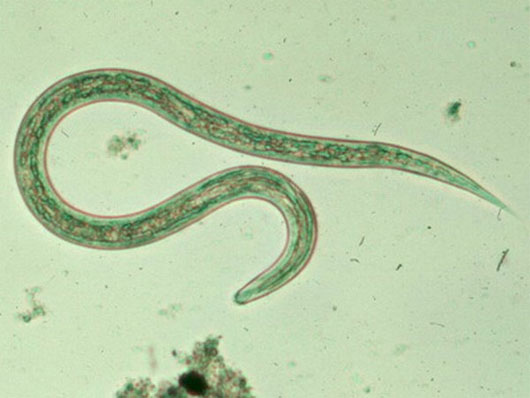Science successfully deciphered the hookworm genome
An international team of scientists said on January 19 that they had successfully deciphered the hookworm genome, hoping to find a more effective treatment for parasitic diseases. out.
The results of this study have now been published in the British Nature Genetics magazine on January 18.
Through analysis, the team identified the genome of hookworms, an important factor that helps the parasite enter the host, "hiding" the attack of the body's immune system.
Scientist Makedonka Mitreva of the Washington University School of Medicine (USA), one of the authors of the study, said the new discovery provided important information about the molecules needed to determine the survival of hookworms. New facilities are the key to helping the medical community build and develop potential therapies for the treatment of hookworm infections.

Hookworms.(Photo: cdc.gov)
Through research, scientists also said, Necator americanus is now one of the two most common parasitic worm species in humans. This worm is dominant in soil. Their lifecycle begins with hatching eggs in the feces of people infected with worms, then hatching larvae in the ground and re-infecting humans through penetration into the skin.
On average, a female hookworm can lay up to 10,000 eggs a day. Infected larvae are able to grow and survive in moist soil, especially sandy and loamy soil. Adult worms about 1cm in size can suck up to 30 microlitres of blood (1 part per million liters) per day and survive in the host for about 10 years.
Hookworms are thought to infect about 700 million people worldwide. They eat blood in the small intestine causing iron deficiency, malnutrition, rickets in children and complications for pregnant women.
This worm is very contagious in poor communities in the tropics and subtropics. They can also live in the small intestine of the host, mammals such as dogs, cats, pigs .
Cough, chest pain, wheezing or fever are symptoms that occur in people who have been exposed to hookworm larvae.
Epigastric pain, dyspepsia, vomiting, constipation or diarrhea may occur at an early or late infection stage although symptoms of intestinal infection may improve over time.
Signs of severe worm infection are anemia, protein deficiency, emaciated people, heart failure, abdominal swelling due to membrane effusion.
In the face of the danger of this parasite, finding new treatments is essential.
Mitreva stressed that the team hopes that the information obtained from the genome of hookworm will help accelerate therapies for developing vaccines and diagnostic procedures.
- Successfully decoding the genome of a 45,000-year-old man
- The first successful decoding of the tomato genome
- The first successful decoding of the wheat genome structure
- Decode the gorilla genome
- Decoded the mackerel genome
- For the first time, Vietnam has successfully built the Vietnamese genome
- Decipher the most common genome of Central America beans
- Vietnam first deciphered the rice genome for the first time
- America successfully deciphered the black rhino genome
- People have relatives with sea urchins
- Decipher the mysterious life of honey bees
- First sketches the genome map of a family
 Animal 'suffering' after hibernation
Animal 'suffering' after hibernation Why do goats climb well?
Why do goats climb well? Scientists were surprised to see chimpanzees eating turtles
Scientists were surprised to see chimpanzees eating turtles Giant catfish died deadly due to drought in Thailand
Giant catfish died deadly due to drought in Thailand